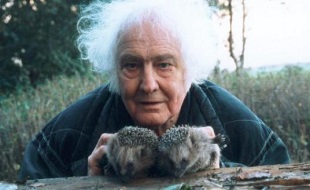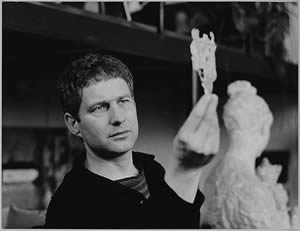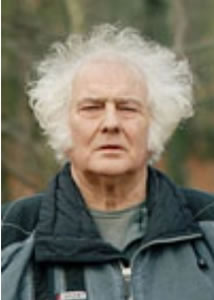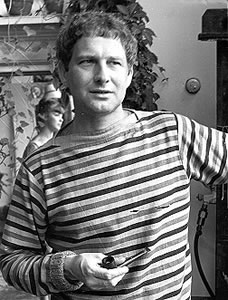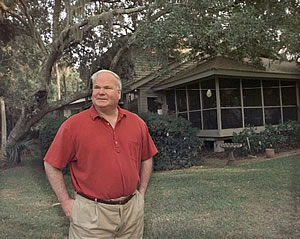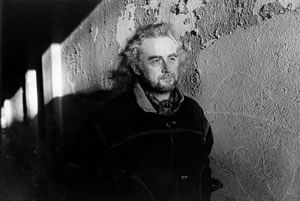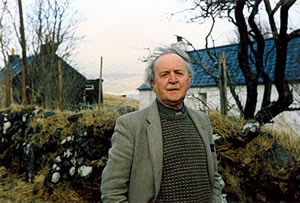De Nederlandse dichter, schrijver en beeldend kunstenaar Jan Wolkers werd geboren in Oegstgeest op 26 oktober 1925. Jan Wolkers overleed vorig jaar op 19 oktober. Zie mijn blog van 19 oktober 2007 en mijn blog van 26 oktober 2006 en ook ook mijn blog van 26 oktober 2007.
Najaar
Soms zie ik dingen bewegen
Die onbewogen zijn,
Als roestvlekken op bladeren
Die wegtrekken als spinsels.
Een engel fluistert in mijn oor,
Een telefoonnummer
Dat is niet te ontcijferen.
De vershoudfolie
Van ons leven
Was al vergaan.
Zoals we ooit begonnen,
Op voetzolen van mos:
Daar stond het riet,
De danseressen van de gele lis,
De wilde roos,
Het schors als fronsen.
Het snoer van zeekraal
Verbrokkelde tot grind.
Een web van schrijnend zilver
Een glasdraad snijdend door het blauw,
Die het uitspansel verdeelt
Tot stellingen van as
Van uitgestrooid gebeente.
De herfst is het einde
De herfst is het einde.
De bomen verwelken tot granaat.
Geef mij toch ook wat van dat rode daar,
De soep wordt snel verorberd tot bedrog.
De morsetekens van het slakkenspoor
Glinsteren als tranenvegen op de stoep.
De poppenwagen schimmelt in de schuur,
Een wang van celluloid is nooit tevreden.
De vaas van mensenvlees wordt goed gevuld,
En volgt het bloedspoor van de vliegenzwammen.
Wie vangt het laatste gele blad?
De dode wesp zit in de kous gevangen,
De nerven kleuren in het weefsel zwart,
We wisten niet dat doodgaan kon gebeuren.
Jan Wolkers (26 oktober 1925 – 19 oktober 2007)
De Engelse dichter, schrijver en biograaf Andrew Motion werd geboren op 26 oktober 1952 in Braintree in Essex. Zie ook mijn blog van 26 oktober 2007.
A Glass of Wine
Exactly as the setting sun
clips the heel of t
he garden,
exactly as a pigeon
roosting tries to sing
and ends up moaning,
exactly as the ping
of someone’s automatic carlock
dies into a flock
of tiny echo-aftershocks,
a shapely hand of cloud
emerges from the crowd
of airy nothings that the wind allowed
to tumble over us all day
and points the way
towards its own decay
but not before
a final sunlight-shudder pours
away across our garden-floor
so steadily, so slow
it shows you everything you need to know
about this glass I’m holding out to you,
its open eye
enough to bear the whole weight of the sky.
Diving
The moment I tire
of difficult sand-grains
and giddy pebbles,
I roll with the punch
of a shrivelling wave
and am cosmonaut
out past the fringe
of a basalt ledge
in a moony sea-hall
spun beyond blue.
Faint but definite
heat of the universe
flutters my skin;
quick fish apply
as something to love,
what with their heads
of gong-dented gold;
plankton I push
an easy way through
would be dust or dew
in the world behind
if that mattered at all,
which is no longer true,
with its faces and cries.
Andrew Motion (Braintree, 26 oktober 1952)
De Duitse schrijver Ulrich Plenzdorf werd geboren op 26 oktober 1934 in Berlijn. Zie ook mijn blog van 26 oktober 2006.
Uit: DIE NEUEN LEIDEN DES JUNGEN W.
„Alles Quatsch, meint Edgar. Er ging nur auf den Bau, weil er dringend Geld brauchte. Er kam bei den Malertrupp unter, führte sich aber als unfähiger, ewiger Querkopf mit zwei linken Händen auf. Bei der Truppe traf er auch Zaremba, einen 70jährigen Böhmer, der ihn als einziger durchschaute. Edgar entdeckte dann, dass die Truppe unter Addis Leitung an einem nebellosen Farbspritzgerät, kurz NFG, baute. Dieses NFG funktionierte mit Druckluft, explodierte dann aber bei der Vorführung vor Experten. Edgars bissige Kommentare nach dem Malheur, verleiten Addi dazu, ihn aus der Truppe zu schmeissen. Edgar beschloss daraufhin, sein eigenes NFG zu bauen. Er erkannte, dass der Nebel durch die Druckluft entsteht, also versuchte er den nötigen Druck mit einer hydraulischen Mechanik zu erzeugen. Auf Zarembas Initiative besuchte der ganze Trupp Edgar in seiner Laube, um ihn als Arbeiter wieder aufzunehmen. Edgar reihte sich wieder brav in den Trupp ein, denn er brauchte Geld und Ruhe, um an seinem NFG zu arbeiten. Wenig später erhielt er einen Brief von Charlie, in dem sie ihm von ihrer Hochzeit mit Dieter berichtet. Er besuchte sie dann und schien sich mit Dieter anzufreunden. Auch am folgenden Tag tauchte er bei ihr auf, weil er eine Rohrzange vergessen hatte. Charlie lud ihn zum Tee ein, während Edgar wieder mit dem Luftgewehr spielte, worauf sie ihn auffordert, sie schiessen zu lernen. Dieter, immer noch aufs Studium konzentriert, gab schliesslich nach und begleitete die beiden zum Bahndamm. Dieter versprach Charlie, am nächsten Sonntag einen Ausflug zu machen. Natürlich tauchte Edgar auch am nächsten Sonntag auf. Eigentlich wollte Charlie zum Bootfahren auf der Spree, doch es regnete wie aus Kübeln, während Dieter vor seiner Schreibmaschine sass. Charlie versuchte ihn mit allen Mitteln dazu zu bewegen, wenigstens nach draussen zu gehen. Endlich meinte Dieter miesig, Charlie und Edgar sollen doch alleine gehen. Stinksauer haute Charlie mit Edgar ab. Die beiden mieteten sich ein Bott (im Dezember) und donnerten über die Spree. Irgendwo ausserhalb Berlins musste Charlie mal und sie fuhren ins Schilf. Kaum war sie zurück, setzten sie sich gemeinsam unter eine Pelerine ins nasse Gras, wo Charlie Edgar fragte, ob er einen Kuss von ihr wolle. Er küsste sie leidenschaftlich. Sie kehrten dann nach Berlin zurück; Charlie hatte es plötzlich sehr eilig und unterwegs ging ihnen das Benzin aus. Edgar steuerte an Land, um Ersatzsprit zu holen; doch sobald er das Schiff festgebunden hatte, stieg Charlie aus und rannte davon. Edgar brachte das Boot schliesslich alleine zurück. In der Laube drehte er voll durch, hörte Musik, tanzte wie verrückt und legte sich schlafen, bis ihn der Lärm eines Bulldozers unsanft weckte. Er stürmte vor die Laube und schaffte es in letzter Sekunde ein Planierfahrzeug zu stoppen, dass die Lauben abreissen sollte. Der Arbeiter liess Edgar noch drei Tage, bis nach Weihnachten, bis die Bude endgültig eingerissen werde. Edgar fühlte sich unter Zeitdruck und wusste, dass er sich bei Charlie nie mehr blicken lassen konnte. Wie ein Verrückter stürzte er sich in die Arbeit und begann zu improvisieren. Er arbeitete mit Stossdämpfern, Dichtungsrohren und einem alten Elektromotoren, für den er die 220 Volt aus der Steckdose auf 380 V Industriestrom hochtransformieren muss. Er wollte unbedingt sein NFG fertigstellen und es Addi auf den Tisch knallen. Er klaute sich sogar die Düse aus Addis Spritze, um den ersten Versuch zu wagen. In der Nacht vom 24. auf den 25. Dezember testete er die Spritze in seiner Laube, merkte nur noch, wie er nicht mehr vom Einschaltknopf loskam und starb an einem Stromschlag.“

Ulrich Plenzdorf (26 oktober 1934 – 9 augustus 2007)
De Amerikaanse schrijver Stephen L. Carter werd geboren op 26 oktober 1954 in Washington, D.C. Carter studeerde aan de universiteiten Stanford en Yale. Daarna werkte hij als jurist, o.a. bij het Supreme Court. Sinds 1982 doceert hij rechten aan Yale. Hij publiceerde eerder allerlei boeken over recht, staat, kerk en integratie. In 2002 publiceerde hij zijn debuutoman The Emperor of Ocean Park. Dit was niet alleen een thriller over een familie van juristen, maar tevens een portret van d
e zwarte bourgousie die de zomer doorbrengt in in Martha’s Vineyard.
Werk o.a.: The Emperor of Ocean Park, (2002), New England White, (2007)
Uit: Palace Council (2008)
„The lawyer was nervous, and that was odd. His hands trembled on the steering wheel, and that was odder still. He had learned in the war that there was no sin in being afraid as long as the others never knew. He understood that courage was a discipline. As was confidence. In the marble caverns of Wall Street, the lawyer intimidated all around him with his breadth of knowledge and speed of mind. In the boardrooms of his clients, he had no equal. On his rare forays into the courtroom, he charmed the judges with his wit and persuaded them with his force. He had commanded a company of Rangers in North Africa and Europe. He provided his adoring wife and children with a house in the suburbs, equipped with every modern convenience. It was the summer of 1952, the era of such men as himself. The United States was about to elect a military man its President. The nation’s steelmakers had just crushed a nationwide strike. The Congress was about to add the words “Under God” to the Pledge of Allegiance. American science had invented a way to phone from California to New York without using an operator. Some people insisted on calling attention to the nation’s imperfections. But the lawyer believed in quiet progress. Quiet, gradual progress. The nation would move forward in its good time. So calm down, he commanded himself, annoyed to discover that he was drumming his fingers on the dash.
He tightened his grip on the wheel.
The driveway was full of cars. The house was long and low. Golden light spilled invitingly from the windows. Still the lawyer hesitated. August air, loamy and rich, drifted into the car. Clouds hid the moon, but the forecasted rain had yet to arrive. The lawyer glanced at the glowering sky and endured a shivering premonition of death. Fighting his growing unease, the lawyer focused his mind on the image of his wife’s glowing face. He shut his eyes and listened to her teasing South Carolina drawl. Calmer now, he reminded himself why he was here.
Dinner and conversation, his host had said, smiling, over coffee in Manhattan. And stag only. No wives.
Why no wives? the lawyer had asked, not unreasonably.
Trust me.
Stephen L. Carter (Washington, 26 oktober 1954)
De Zweedse dichteres en schrijfster Karin Maria Boye werd geboren op 26 oktober 1900 in Göteborg. Tussen 1921 en 1926 studeerde zij aan de universiteit van Uppsala. In 1925 sloot zij zich aan bij de Zweedse afdeling van de Clarté-beweging van de Franse pacifist Henri Barbusse. Zoals veel Scandinavische intellectuelen bezocht zij in het interbellum de Sovjet Unie en keerde teleurgesteld door de realiteit naar haar land terug. Uiteindelijk studeerde zij af als filosofe aan de Hogeschool van Stochholm. In het begin van de jaren dertig werkte zij als lerares en als journaliste. In 1922 publiceerde Boye haar eerste gedichten. In 931 richtte zij samen met Erik Mesterton en Josef Riwkin het tijdschrift Spektrum op, om T.S. Eliot een de surrealisten in Zweden meer bekendheid te geven. Met Mesterton vertaalde zij ook het belangrijkste werk van Eliot. In 1941 pleegde Karin Boye zelfmoord door vergif in te nemen.
LERNE SCHWEIGEN
Voll Unheil ist der Erde Nacht.
Herz, lerne schweigen.
Nur harte Seelen, harte Schilder
spiegeln Glanz aus Sternenheimat.
Dein Klagen schwächt nur deine Kraft.
Herz, lerne schweigen.
Nur Stille heiligt, Stille härtet,
unberührt und rein und wahr.
Du suchst die heiße Lebensqual!
Herz, lerne schweigen.
Die Fieberschauer heilen dich nicht.
Stählern glänzt die Himmelsburg.
KINDER DES WASSERS
Um unsre Wiege wogten sanft wie Seegras
durchsichtige Wassergeister, ungreifbare.
Zeitlos ruhten wir glücklich in windloser Tiefe.
Wer vertrieb uns aus unserer Heimat?
Wie wirbelnde Blasen sausten wir gegen das Licht,
wie glänzende Silberfische glitten wir in bleigraue See.
So standen wir an einem Morgen mit tropfendem Haar
am Ufer
in einem fremden Land.
Niemals finden wir heim.
Wir wandern weiter wie im Traum.
Unsere feuchten dunklen Augen scheuen die Sonne.
Unsere kühlen und sanften Hände scheuen das Handeln.
Unsere fließenden und fliehenden Seelen scheuen das
Lieben.
Sie schlingen sich wie Schlangen um alles brennend
Heiße . . .
Wie im Traum gehen wir, unsere Welt ist Schaum.
Unser fernes kühles Lächeln ist ein Gruß aus unseres
Vaters Reich,
wo Portale aus glasgrünem Wasser sich wölben-
Portale zur ewigen Ruhe.
Vertaald door Hildegard Dietrich

Karin Boye (26 oktober 1900 – 24 april 1941)
De Russische schrijver en theoreticus van het symbolisme Andrej Bely werd geboren op 26 oktober 1880 in Moskou. Van 1899 tot 1903 studeerde hij aan de universiteit van Moskou. Een tweede studie in de historische filologie brak hij af om zich aan de literatuur te kunnen wijden. Als jonge schrijver stond hij onder invloed van o.a. Arthur Schopenhauer, het Boeddhisme en Friedrich Nietzsche. Tot diens dood in 1921 was Bely nauw bevriend met Alexander Blok. Vanaf 1904 werkte hij aan een theoretische grondslag van hhet symbolisme. Na zich verdiept te hebben in de filosofie van Kant hield hij zich tussen 1912 en 1916 bezig met de anthroposofie van Rudolf Steiner. In de jaren twintig keerde hij zich echter daar weer van af.
Uit: Petersburg (Vertaald door Charles B. Timmer)
„De planmatigheid en symmetrie kalmeerden de zenuwen van de senator die zowel door de schokken van zijn huiselijke leven als door de hulpeloze rotatie van ons staatswiel in de war waren geraakt. Zijn smaak blonk uit door harmonische eenvoud. Het meest van alles hield hij van de rechtlijnige prospekt die hem aan het tijdsverloop tussen twee levenspunten deed denken.
(…)
Hier, in zijn kamer, was Nikolaj Apollonovitsj inderdaad uitgegroeid tot het centrum waar hij voor zichzelf aanspraak op maakte, tot een reeks vanuit dat centrum voortvloeiende logische premissen die het denken, de ziel en die tafel daar bepaalden: hij vertegenwoordigde hier het enige centrum van het heelal, het denkbare zowel als het ondenkbare.
Dit centrum was een logische gevolgtrekking uit zijn denken“.
Andrej Bely (26 oktober 1880 – 8 januari 1934)
Portret door Lion Bakst
De Ierse dichter Trevor Joyce werd geboren op 26 oktober 1947 in Dublin. In 1967 was hij medeoprichter van de New Writers’ Press in Dublin in 1967 en in 1968 van de The Lace Curtain; A Magazine of Poetry and Criticism. Tot zijn eerste boeken behoren Sole Glum Trek (1967), Watches (1968), Pentahedron (1972) The Poems of Sweeny Peregrine (1976). Na een schrijversstilte van zo’n twintig jaar kwam hij terug met o.a. Syzygy en Without Asylum (1998).
Love songs from a dead tongue
4
Breaks the heart keening
as the edge keen the king,
keen Niall Blackknee
gracious as great.
[This is doubtful]
Ask what breaks my heart:
keening Niall the bright laughing;
till doomsday the heart hurt
atrociously wasting.
First I came into Munster:
high-king’s consort queen
to arch-bishop Cormac
the perfectly-bright.
Then next into Leinster
in which rich realm
though some muttered
I did not starve.
[This transition is difficult]
. . . came Tara’s heir,
that true prince,
successor to arch-kings.
Together we shared
childhood in Tara,
concentric city
of the true promised land.
That destroyer of pastures,
that master of plunder,
that fiercest of men,
deepest red amongst Irish.
The place where he fell
broke my heart
[this line is lost]
nor does Donal survive him.
Niall, king, son of kings,
Donal, soft face unfurrowed,
dead detach me from kin,
reduce heart to sheer blood.
I am Gormlaith, the keening:
first husband-king Cormac,
son Donal, fierce Niall,
these three broke my heart.
O King of the stars,
grant mercy to Niall,
O Mary, great queen,
shield this cold keening
breaks.
Trevor Joyce (Dublin, 26 oktober 1947)
De Amerikaanse schrijver Pat Conroy werd geboren op 26 oktober 1945 in Atlanta, Georgia. Hij kreeg een opkeiding aan The Citadel, een militaire school in South Carolina. Hij publiceerde zijn eerste roman The Great Santini in 1976. Omdat het boek nogal autobiografisch was leverde het moeilijkheden met zijn familie op. Conroy werkte ook als leraar, maar werd vanwege zijn onconventionel lessen ontslagen. Deze ervaringen verwerkte hij in The Water is Wide, in 1974 verfilmd als Conrack, met Jon Voight. De publicatie van The Lords of Discipline in 1980 leidde opnieuw tot veel commotie, ditmaal bij zijn oud-medeleerlingen van de militaire opleiding. In 1986 verscheen The Prince of Tides, dat in 1991 werd verfilmd met Nick Nolte en Barbara Streisand.
Uit: My Losing Season (2002)
“It was on the morning of October 15, 1966, that the final sea-son officially began. For a month and a half, my teammates and I had gathered in the field house to lift weights, do isometric exercises, and scrimmage with each other. Right off, I could tell our sophomores were special and were going to make our team faster, scrappier, and better than the year before. In the heat of September, there was a swiftness and feistiness to the flow of these pickup games that was missing in last year’s club. My optimism about the coming season lifted perceptibly as I observed my team beat up on each other in the vagrancy of our uncoached and unmonitored scrimmages.
I could feel the adrenaline rush of excitement begin as I donned my cadet uniform in the dark, and it stayed with me as I marched to mess with R Company. I could barely concentrate on the professors’ voices in my classes in Coward Hall as I faced the reality of the new season and stared at the clock with impatience. It was my fourth year at The Citadel and the fourth time October 15 had marked the beginning of basketball practice. Mel Thompson was famous for working his team hard on the first day and traditionally ran us so much that the first practice was topped off by one of us vomiting on the hardwood floor.
I made my way to the locker room early that afternoon because I wanted some time to myself to shoot around and think about what I wanted to accomplish this season. Four of my teammates were already dressed when I entered the dressing room door. The room carried the acrid fragrance of the past three seasons for me, an elixir of pure maleness with the stale smell of sweat predominant yet blended with the sharp, stinging unguents we spread on sore knees and shoulders, Right Guard deodorant spray, vats of foot powder to ward off athlete’s foot, and deodorant cakes in the urinals. It was the powerful eau de cologne of the locker room. I realized that my life as a college athlete was coming to its inevitable end, but I did not know that you had to leave the fabulous odors of youth behind when you hurried out into open fields to begin life as an adult.”
Pat Conroy (Atlanta, 26 oktober 1945)
De Schotse dichter Sorley MacLean (Schots Gaelic: Somhairle MacGill-Eain) werd geboren op 26 oktober 1911 Osgaig op het eiland Raasay. Hij studeerde in Edinburgh en keerde na zijn studie naar zijn eiland terug om les te geven. MacLean keerde zich af van Presbyteraanse geloof. Hoe had meer sympathie voor links en hij was communist tot het midden van de jaren veertig, hoewel hij geen marxist was. Tijdens WO II diende hij in het noorden van Afrika in het Britse leger en raakte verschillende keren gewond. Zijn vroegste gedichten schreef hij in het Engels, maar na zijn eerste Gaelic gedicht, An Corra-Ghridheach (“The Heron”), besloot hij dat dit beter was dan al zijn Engelse werk en bleef hij in zijn moedertaal schrijven.
Calvary
My eye is not on Calvary
nor on Bethlehem the Blessed,
but on a foul-smelling backland in Glasgow,
where life rots as it grows;
and on a room in Edinburgh,
a room of poverty and pain,
where the diseased infant
writhes and wallows till death.
The Cry of Europe
Girl of the yellow, heavy-yellow, gold-yellow hair,
the song of your mouth and Europe’s shivering cry,
fair, heavy-haired, spirited, beautiful girl,
the disgrace of our day would not be bitter in your kiss.
Would your song and splendid beauty take
from me the dead loathsomeness of these ways,
the brute and the brigand at the head of Europe
and your mouth red and proud with the old song?
Would white body and forehead’s sun take
from me the foul black treachery,
spite of the bourgeois and poison of their creed
and the feebleness of our dismal Scotland?
Would beauty and serene music put
from me the sore frailty of this lasting cause,
the Spanish miner leaping in the face of horror
and his great spirit going down untroubled?
What would the kiss of your proud mouth be
compared with each drop of the precious blood
that fell on the cold frozen uplands
of Spanish mountains from a column of steel?
What every lock of your gold-yellow head
to all the poverty, anguish and grief
that will come and have come on Europe’s people
from the Slave Ship to the slavery of the whole people?
Sorley MacLean (26 october 1911 – 24 november 1996)
